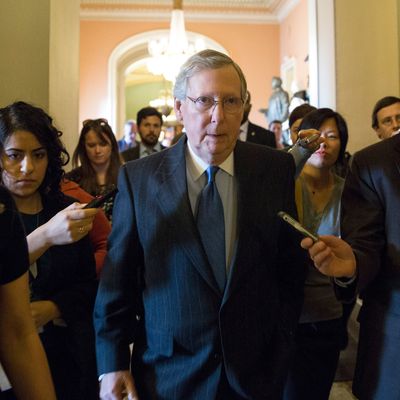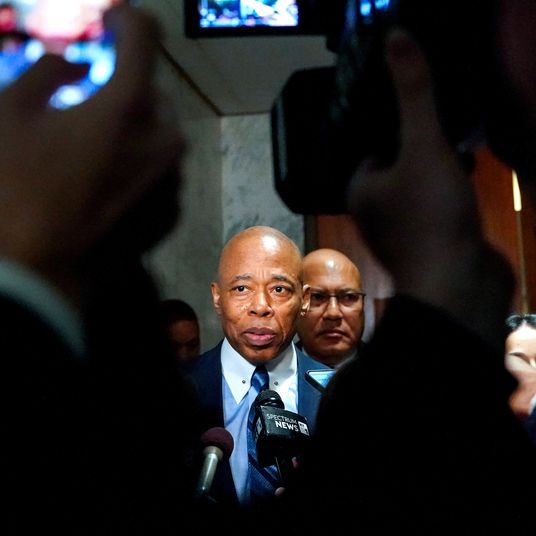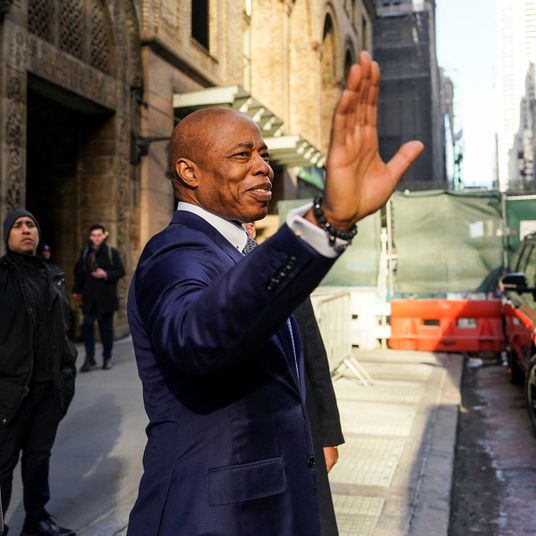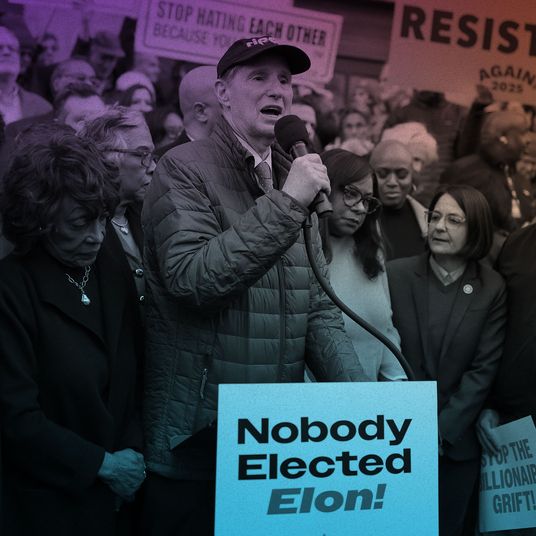
As we proceed from the tax cut fight to the next steps of the economic showdown between President Obama and Republicans in Congress, the first immediate problem is the radical asymmetry of the two sides’ stances. Obama is proposing that the two sides reduce the long-term deficit through a combination of cuts to retirement programs and reducing tax deductions. The two sides already put into place a trillion and a half dollars in spending cuts last year, followed by $600 billion in tax increases last week. Obama proposes the next round of deficit reduction be split halfway between cuts to retirement programs and higher revenue by paring back deductions in the tax code.
Republicans say that the fair thing is to do all cuts and no revenue. Mitch McConnell writes:
Predictably, the President is already claiming that his tax hike on the “rich” isn’t enough. I have news for him: The moment that he and virtually every elected Democrat in Washington signed off on the terms of the current arrangement, it was the last word on taxes. That debate is over.
John Cornyn adds, “Tax cuts didn’t cause this problem, so tax increases won’t solve it.” This argument manages to pack two obvious falsehoods in a mere dozen words. (The Bush tax cuts created almost all of the structural deficit, and even if a deficit had been caused by higher spending, it could be eliminated through tax increases, just as a revenue-caused deficit could be eliminated by spending cuts.)
So that’s one problem: Obama is calling for a 50-50 split, and Republicans are calling for something more along the lines of 100-0. Of course, making incredibly implacable demands is what Republican politicians do these days. The real question is ultimately what each side would accept, and how uncomfortable they find the alternative (namely, automatic spending cuts, which heavily hit defense spending.)
But this leads to a second problem. In trying to figure out what Republicans would ultimately be willing to agree to, it would help to follow the demands of conservative writers associated with the party. Reading through several such pieces, I noticed something striking: None of them actually grapple with Obama’s proposal.
Don’t believe me? The Wall Street Journal editorial page insists Obama’s offer requires more tax rate hikes. Jonah Goldberg rages at Obama’s hard-line negotiating. Rich Lowry asserts Obama is “not the least bit interested” in spending cuts. Byron York claims that Obama “has never shown any serious interest in cutting spending.”
Obviously, Republicans are going to have a different preference than Obama on policy outcomes. They would prefer bigger spending cuts, and no more revenue. Yet it simply is a fact that Obama has offered to cut spending. The question is whether Republicans should at any level now trade higher revenue through reduced tax deductions for lower spending on social insurance programs. Maybe the answer is no! But they won’t even face up to the question. They’re not arguing that it’s unacceptable to trade revenue for cuts. They just won’t deal with the dynamic at all.
Among other things, this makes it hard for Republicans in Congress to figure out what their base will tolerate. Obviously, they want a deal with lots of cuts to social programs and zero new revenue. Obama won’t give them that. They can cut a 50-50 spending/revenue deal. Maybe they can push Obama higher than 50-50. They’re not going to get 100-0, though. So, do they want Republicans to not make any deal? That leaves — unresolved — the automatic sequestration cuts. Maybe Republicans really want to see if Obama will cancel them out and replace them with nothing. Or maybe they’ll accept some revenue if more of the spending cuts hit programs for the poor and less hit programs for the middle class. Who knows?
I suspect conservatives, at least in the aggregate, want the same thing they’ve wanted for two decades — the lowest possible taxes on the rich, full stop, with spending a distant second priority. But most of them won’t actually say that. A good many may not even want it. As of now the conservative line appears totally opaque.






























